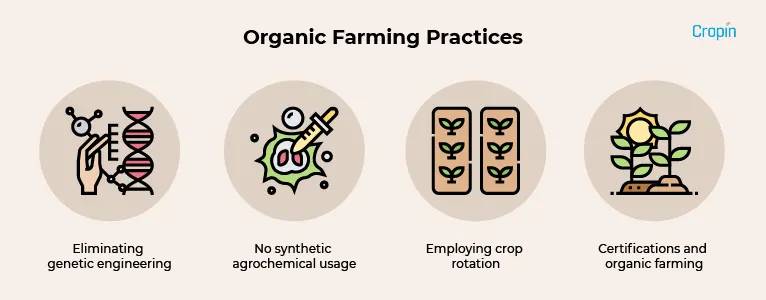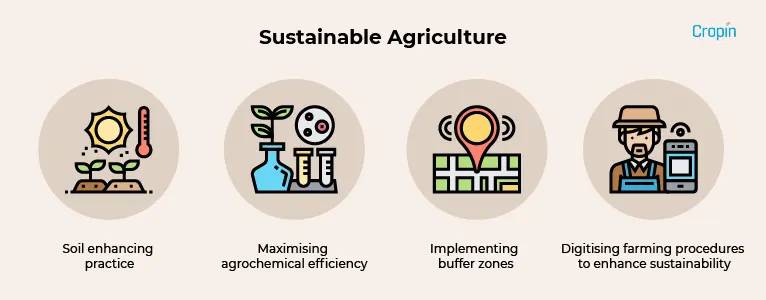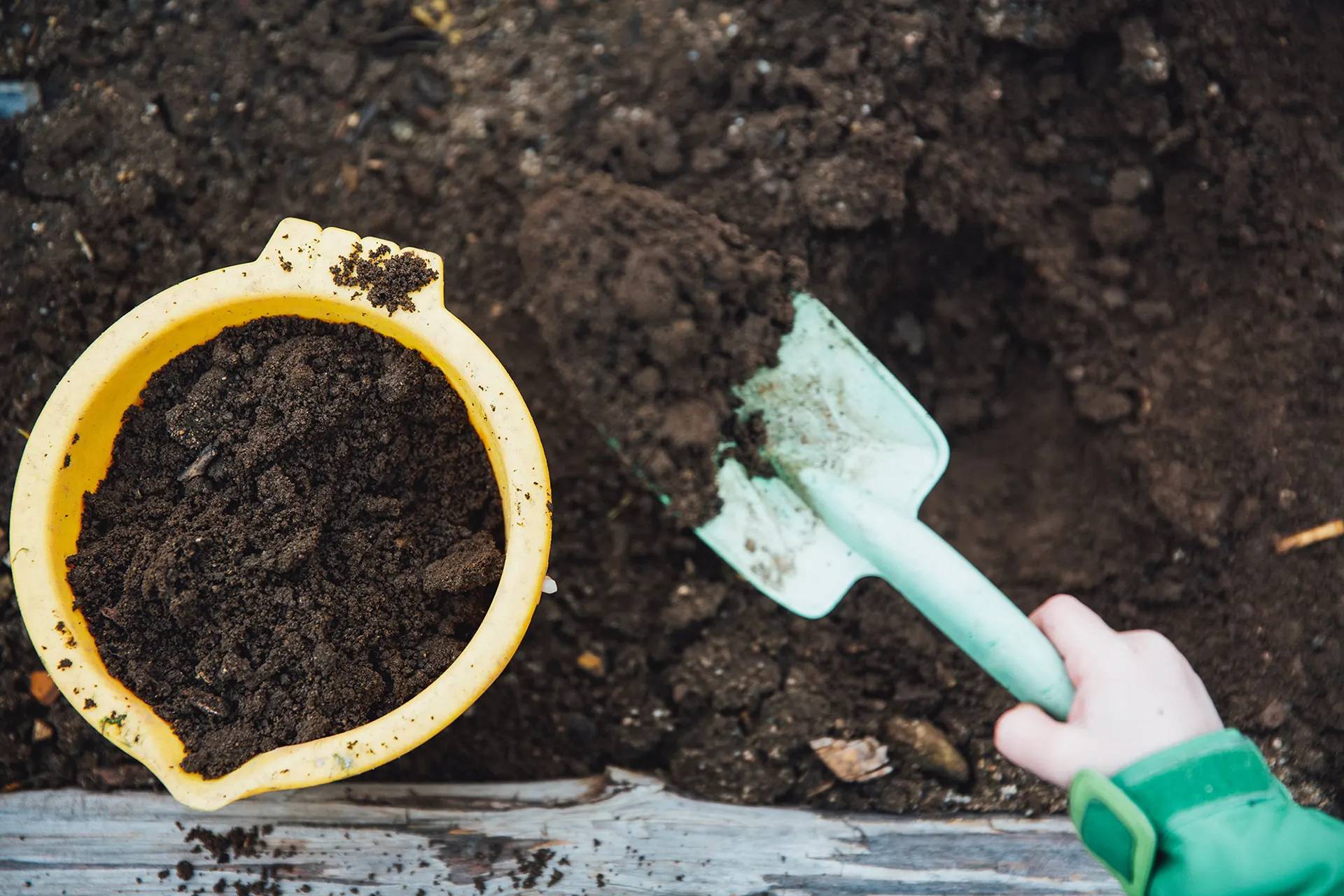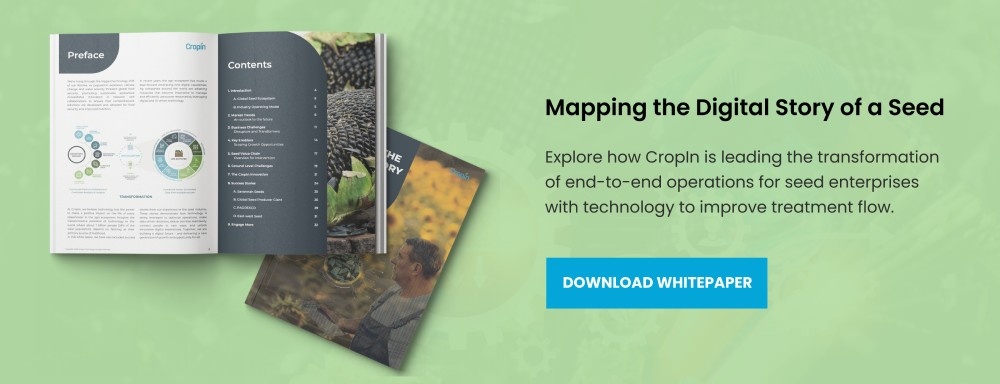As the world progressively moves toward an ecological and cost-effective approach to agriculture, a common confusion still prevails. Most individuals use the terms organic farming and sustainable farming practices interchangeably to describe similar techniques.
Although both serve the similar bigger goal of environment-friendliness, they are considerably different. A detailed understanding of both will help you realize that organic farming can form a part of diverse, sustainable agriculture practices. However, it does not necessarily have to.
Take a look at each farming practice to understand the differences and how Cropin can help you achieve both.
ORGANIC FARMING AND SUSTAINABLE AGRICULTURE
Before drawing comparisons between the two, it is essential to understand what each means.
Organic farming
It is a system of agriculture where, instead of using synthetic fertilizers, insecticides, and pesticides, producers use biologically-derived fertilizers like manure, animal compost, and plant wastes to cultivate crops. Organic farming practices promise many ecological benefits like reduced soil erosion, minimized leaching of nutrients into groundwater, and waste recycling, to name a few.
Even though organic farming is eco-friendly and sustainable in its ways, farming communities globally have been slow to adopt it as the input costs are high and yields may be low in the initial years. Moreover, it is challenging to implement and follow organic farming practices for larger land sizes.

Sustainable Agriculture
Sustainable agricultural practices focus on the bigger picture. Any and all techniques enabling farmers to cultivate to improve their economic stability and are environment friendly, including reducing carbon emissions, cutting down wastage, and ensuring crop and soil health, can be categorized as sustainable agriculture practices.
Sustainable agricultural practices are viable for the smallholder farmers helping them maximize their utilization of resources and acreage. For instance, sustainable farms can employ chemical agri-inputs appropriately, as long as it does not disrupt their overall sustainability.
Organic farming, however, eliminates the usage of these inputs.

WHAT CONSTITUTES ORGANIC AND SUSTAINABLE AGRICULTURE PRACTICES?
Organic Farming Practices

Photo by Markus Spiske
Described below are some of the most standard organic farming practices.
Eliminating genetic engineering:
Organic farming prohibits the usage of genetically modified organisms (GMO). The first step to ensuring food free of GMOs is using organic seeds. Farm owners may need accessibility to organic seeds to eliminate the usage of genetically modified components in their farms.
Contract farming companies and other producers/growers can use SmartFarm by Cropin to keep tabs on the farm operations and farmers’ agri-input usage. The farm management software enables them to configure and share crop-specific packages of practices (PoPs) and activity plans to the farmers and push weather updates to optimize their organic yield. The solution also offers acreage insights, yield estimates, sowing time and harvest date estimate remotely.
No synthetic agrochemical usage:
Organic farming restricts the usage of synthetic fertilizers. Instead, farmers use manure (plant and animal waste) and compost to improve soil fertility. Soil microbes are needed to ensure that the nutrients reach the ground and enrich the soil quality. Before every crop season, farmers employ other practices such as tilling in cover crops to minimize soil erosion and improve soil health by providing organic matter and nutrients.
Employing crop rotation:
Another way organic farming enhances soil fertility is through practices like crop rotation. Cultivating a single crop on a plot for extended periods depletes the soil of its nutrients. Incorporating crop variety is a way to enhance soil health, as different plants synthesize different nutrients. In turn, this reduces the requirement for artificial fertilizers.
Certifications and organic farming:
Farmers who produce and cultivate organically and contract farming and other food and beverage companies that use organic produce must adhere to guidelines, procedures, and practices documented and fleshed out by the regulatory bodies to get the products certified as “organic”. The certification protects consumers from false advertising and misleading claims. Moreover, it provides assurance that eco-friendly agriculture practices that support a more sustainable and natural environment were adopted by the producers. The certification guidelines typically prohibit the use of synthetic fertilizers and crop protection products, genetically engineered seeds, and catalytic agents. They also have set standards for preparing the farmland for crop production and for the rearing and management of livestock and poultry.
Organic farming as a practice has been increasing steadily year on year. The Organic Farming report shows a global uptake of 1.6%. However, farms can officially identify as organic only after receiving certification from relevant authorities in each region.
How does agritech optimize the organic food supply chain from end to end? Learn more here.
Sustainable Agriculture
Here is how farmers can adopt sustainable agriculture practices to facilitate ecological as well as economical solutions.
Soil enhancing practices:
Individuals can adopt Sustainable agricultural practices like no-till farming to reduce soil disturbance. Additionally, they can implement soil armor by planting cover crops to prevent soil erosion by wind and water on bare land. Agroforestry or planting trees along with crops can also aid in further preventing soil erosion.
During this entire time, farmers can keep track of soil health by integrating their sensors with the SmartFarm platform to get real-time alerts and notifications. Accordingly, they can adopt suitable techniques to improve soil health.
Maximizing agrochemical efficiency:
While organic agriculture ensures the usage of organic agri-inputs, sustainable farming focuses on increasing the efficacy of agri-inputs by monitoring crop health, the types of fertilizers used, and soil nutrient information in near-real-time using applications like SmartFarm. With Cropin’s SmartFarm, enterprises can monitor crop health and crop life cycle stages, track agri-input applications, and keep a close tab on acreage insights to maximize per acre value for your farms.
Implementing buffer zones:
Another robust way to reduce chemical run-offs is incorporating buffer zones in agricultural fields. These include filter strips, riparian zones, and grass waterways. These structures prevent the washing off of nutrients, sediments, and agrochemicals. As a result, lands can retain inputs for a longer time, curbing multiple applications of fertilizers, pesticides, and the like. It also reduces contamination of surface and groundwater due to harmful chemicals.
Digitizing farming procedures to enhance sustainability:
One of the best ways to strengthen sustainable agriculture practices is to digitize these practices. Utilizing Cropin’s tech-powered platform to automate and streamline several methods adds to the economical solutions by reducing workforce requirements, bringing in standardization to field operations, and driving farm productivity.
Farmers can make these processes even more economical with accurate yield prediction by SmartRisk. Agri-input and agri-machinery providers can use this information to plan sales and marketing strategies effectively beforehand.
How is soil carbon sequestration a sustainable approach to agriculture? Discover here.
In conclusion, organic farming is considered the cleanest method of growing crops, vegetables, fruits, and other plants. It emphasizes supporting the long-term health of both the environment and the people by avoiding eliminating toxins and dangerous chemicals that consumers may otherwise ingest. On the other hand, sustainable agriculture considers the overall treatment of farming lands and the practices involved in crop production, to ensure producers can meet current-day needs without compromising the future generation’s ability to provide for their own.
However, farm-owners can utilize both together to serve the cause of eco-friendly agriculture. It can also help them gain popularity with environment-conscious customers. In this regard, businesses can use RootTrace to help customers track the origin of their food products, thereby building transparency around the produce quality and delivering on the promise of sustainable practices.








